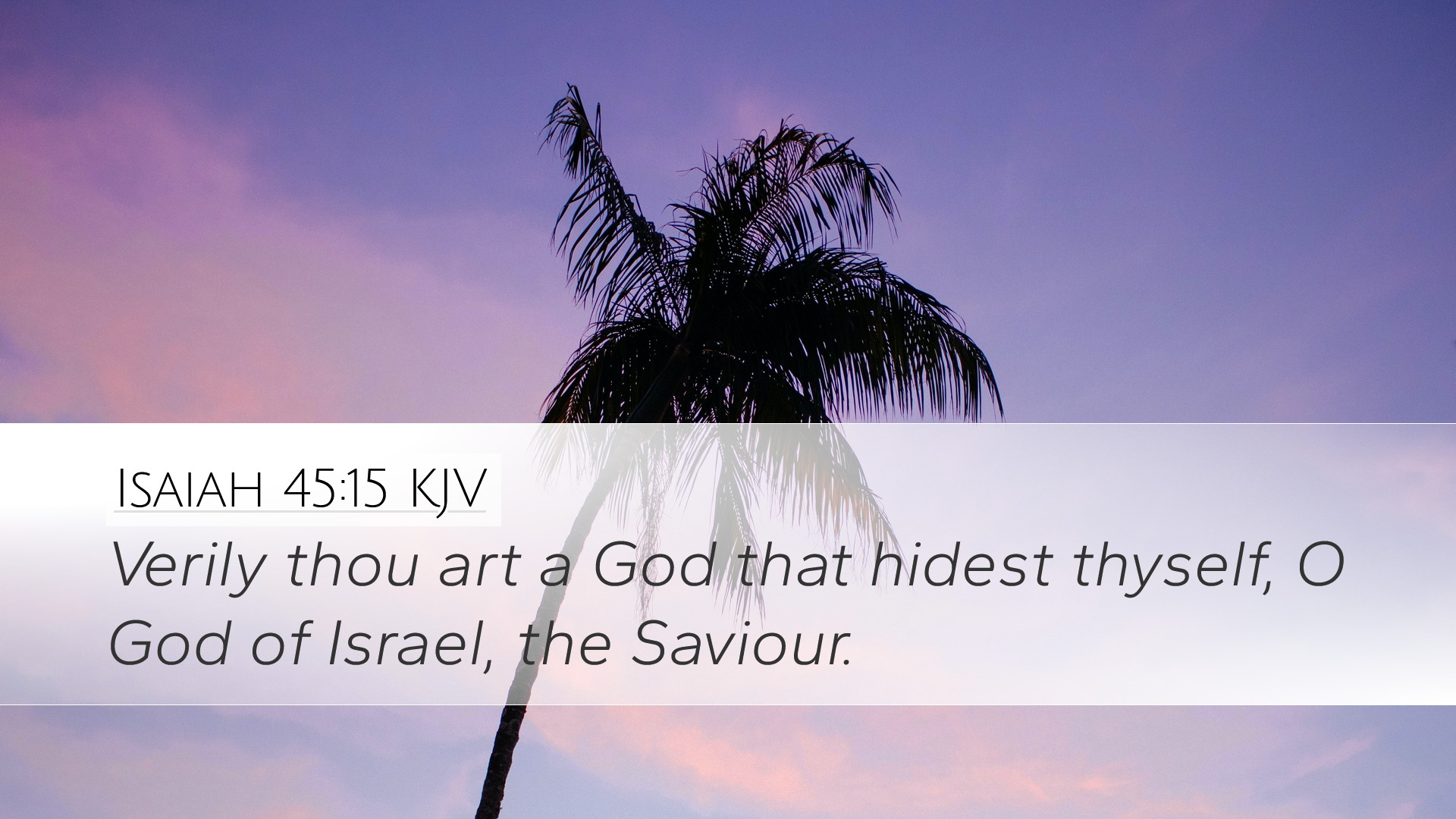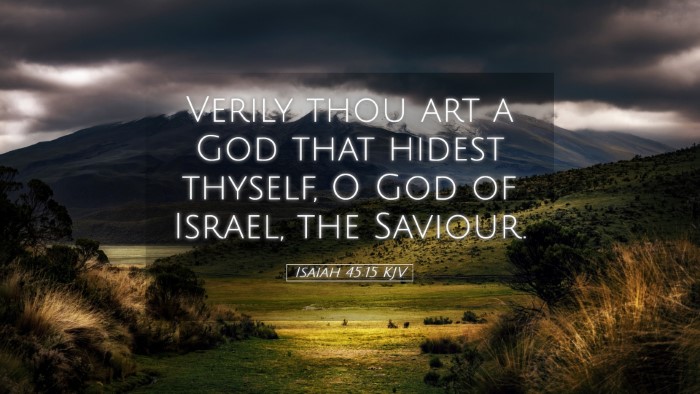Commentary on Isaiah 45:15
Verse: Isaiah 45:15
"Verily thou art a God that hidest thyself, O God of Israel, the Saviour."
Introduction
This verse from the book of Isaiah encapsulates profound theological insights regarding the nature and character of God, particularly His hiddenness and role as the Savior. Various public domain commentaries provide a multifaceted exploration of this verse, shedding light on its deeper meanings and implications for believers.
Theological Significance
Isaiah 45:15 opens a discussion on God's hiddenness. It emphasizes that while God is indeed a Savior, He often operates in ways that are not immediately evident to humanity. This theme resonates throughout Scripture, reflecting a God who, though unseen, is actively at work in the world.
1. The Hiddenness of God
Matthew Henry Commentary: Henry suggests that God's hiddenness does not imply absence but rather the mystery of His will. God is seen to be actively involved in human affairs while also being transcendent and beyond full human comprehension. The notion that God 'hides' Himself serves to remind believers of their need for faith. It acknowledges that understanding God fully is beyond human capability.
2. God as the Savior
Albert Barnes Notes: Barnes emphasizes the comforting aspect of God being identified as the 'Savior.' Despite His hiddenness, God’s active role as Savior offers assurance to His people. This aspect underlines that God desires to save, redeem, and restore humanity to Himself. The dual nature of God as both hidden and revealed unfolds a deeper understanding of His redemptive plan throughout history.
3. The Cry for Recognition
Adam Clarke's Commentary: Clarke reflects on the longing of humanity to recognize and understand God. He points out that the verse portrays a sentiment of awe and reverence. The acknowledgment of God being a Savior, despite His hiddenness, invites believers to seek Him earnestly. Clarke suggests that in a world rife with challenges, this verse serves as a reminder that God’s presence and salvation are always accessible through faith.
Contextual Analysis
Isaiah 45 is set against the backdrop of Israel's return from exile. This context enhances the understanding of God's character as both a deliverer and a mysterious presence. The juxtaposition of Israel’s struggles with God’s promises highlights the significance of faith in recognizing God’s hand in their history and future.
1. Historical Context
The Babylonian exile left the Jewish people questioning the nature of God’s promises. During times of anguish, the understanding of God being hidden becomes particularly pertinent, as it reflects the struggle between perceived abandonment and the reality of God’s continual presence.
2. Literary Context
In the preceding verses, Isaiah portrays God’s sovereignty over nations and His power to bring salvation to His chosen people. This builds upon the idea that the hidden God is unmistakably active in the orchestration of events, guiding history toward fulfillment of His divine purposes.
Application for Believers
Isaiah 45:15 serves as an important theological touchstone for pastors, students, and scholars alike. The insights drawn from the commentators can guide applications in various contexts:
- Encouragement in Trials: Recognizing God’s hidden presence can provide comfort during personal struggles, encouraging believers to lean into their faith, trusting in God’s ultimate plan.
- Evangelistic Implications: Understanding God as the Savior allows for a robust evangelistic message, stressing the importance of seeking Him who is often unseen yet profoundly involved.
- Faith Development: The concept of seeking a hidden God can foster a deeper faith journey, urging believers to pursue a relationship with God beyond superficial understandings and experiences.
- The Role of Revelation: The necessity of Scripture in revealing God’s character underscores the importance of study and contemplation of the Word for spiritual growth and knowledge.
Conclusion
Isaiah 45:15 speaks volumes about the nature of God as both hidden and revealed, a tension that invites contemplation and faith. By reflecting upon insights from Matthew Henry, Albert Barnes, and Adam Clarke, we gain a deeper understanding of God’s mysterious ways and affirm His role as our Savior. For the pastor, the theologian, or the layperson, this verse provides profound truths that can guide both personal faith and communal worship.


